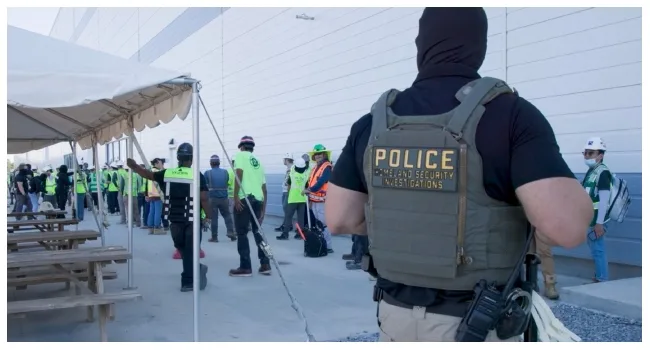South Korea is preparing to dispatch a chartered flight as early as Wednesday to repatriate hundreds of its nationals detained in a US immigration raid, according to national carrier Korean Air.
US immigration authorities detained 475 people last Thursday during a large-scale operation at a Hyundai-LG battery manufacturing plant under construction in the southern state of Georgia. Hundreds of the detainees are believed to be South Korean nationals.
The raid, described by US officials as the largest single-site immigration enforcement action under President Donald Trump’s administration, has sparked a diplomatic response from Seoul.
South Korea’s Foreign Minister departed for Washington on Monday for emergency talks, calling the mass detentions a “grave situation” and vowing to ensure the swift and safe return of the affected workers.
Korean Air confirmed on Tuesday that it plans to send a chartered Boeing 747-8i to Atlanta as early as Wednesday to facilitate the repatriation.
“That is our goal for now,” a Korean Air spokesperson told AFP.
Seoul has said a repatriation agreement has already been reached with US authorities and that the flight will proceed once final administrative procedures are completed.
The raid targeted a $4.3 billion joint venture between Hyundai and LG Energy Solution to build a battery cell manufacturing facility in Georgia—part of South Korea’s growing investment in U.S. clean energy infrastructure.
Experts believe many of the detained workers may have been on non-immigrant visas that do not permit manual labor or on-site construction work, raising legal concerns about visa misuse.
In response to the incident, President Trump posted a warning on social media Sunday, saying:
“Your investments are welcome, and we encourage you to LEGALLY bring your very smart people. Obey our laws.”
LG Energy Solution confirmed that 47 of its own employees were arrested—46 South Koreans and one Indonesian. The company added that an estimated 250 of the detainees were workers hired by its contractor, the majority of whom are also South Korean nationals.
Hyundai, meanwhile, said it understands that none of those arrested are directly employed by the company.
The incident has drawn scrutiny not only over immigration compliance but also over the risks foreign investors face amid increasingly strict U.S. enforcement policies, despite South Korea’s strategic economic and security alliance with Washington.
South Korea, Asia’s fourth-largest economy, has responded to repeated U.S. calls for increased foreign investment in American industries, particularly during trade negotiations involving tariffs and technology.


